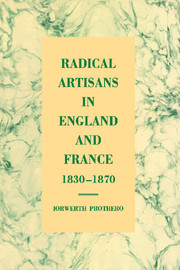Book contents
- Frontmatter
- Contents
- Acknowledgements
- List of abbreviations
- Introduction
- 1 Artisans
- 2 Radicalisms
- 3 Trade unionism
- 4 Work and radicalism
- 5 Socialism
- 6 Co-operation
- 7 Class and radicalism
- 8 Political action and organisation
- 9 Education and civilisation
- 10 Religions and philosophy
- 11 The culture of radical clubs
- Conclusion
- Notes
- Select bibliography
- Index
3 - Trade unionism
Published online by Cambridge University Press: 24 November 2009
- Frontmatter
- Contents
- Acknowledgements
- List of abbreviations
- Introduction
- 1 Artisans
- 2 Radicalisms
- 3 Trade unionism
- 4 Work and radicalism
- 5 Socialism
- 6 Co-operation
- 7 Class and radicalism
- 8 Political action and organisation
- 9 Education and civilisation
- 10 Religions and philosophy
- 11 The culture of radical clubs
- Conclusion
- Notes
- Select bibliography
- Index
Summary
In an approach that sees artisan radicalism as a response to working class life, an important place is given to trade unions, as the classic institutions of the world of work. But this is not straightforward, for the multiplicity of actions, organisations, and functions that can be subsumed under the term ‘trade unionism’ makes generalisations very difficult, and, while the enduring importance of workplace activities and industrial action is evident, we must not assume that formal organisations had always the same concerns and functions as informal action, or that they were direct emanations from the workplace or working communities. What a study of these forcefully reveals is divisions and hierarchies in the workforce, and hostilities and conflicts between organisations, none of them obvious sources of strength for radicalism.
The essential starting-point in looking at trade unionism is the diversity and precarious existence of the working population, the male sector alone full of what were often antagonistic divisions between peasants, servants, labourers, masters, supervisory and clerical staff, and settled and mobile workers, and the urban trades themselves characterised by virtually permanent insecurity. Learning a trade was only done on the job, from experienced workmen through oral transmission, precept, and example. Finding and then keeping employment was not easy in a world of small units without long, steady runs of orders, so that men were not permanently employed by the same master but were taken on for short periods. While steady employment in a single firm over a long period of time might occur in some new industries, irregularity of employment was the norm, so much so that artisans often purposely worked for more than one employer.
- Type
- Chapter
- Information
- Radical Artisans in England and France, 1830–1870 , pp. 46 - 93Publisher: Cambridge University PressPrint publication year: 1997



